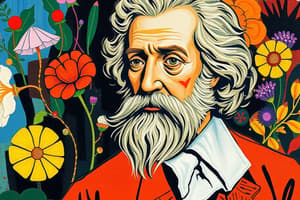Podcast
Questions and Answers
Who is considered the proponent of Botany?
Who is considered the proponent of Botany?
- Theophrastus (correct)
- Pliny the Elder
- Matthias de L’Obel
- Albertus Magnus
Who was the first to introduce the concepts of monocots and dicots?
Who was the first to introduce the concepts of monocots and dicots?
- Theophrastus
- Albertus Magnus (correct)
- Pliny the Elder
- Otto Brunfels
Which ancient scholar gathered knowledge on medicinal plants and wrote about them in De materia Medica?
Which ancient scholar gathered knowledge on medicinal plants and wrote about them in De materia Medica?
- Jerome Bock
- Charles Clusius
- Dioscorides (correct)
- Leonhart Fuchs
Which botanist established the Leiden Botanical Garden?
Which botanist established the Leiden Botanical Garden?
Who illustrated native plants from the Americas and tried to outdo Brunfels' work?
Who illustrated native plants from the Americas and tried to outdo Brunfels' work?
Which botanist believed that botany must be based on exact observations and wrote 'Stirpium Adversaria Nova'?
Which botanist believed that botany must be based on exact observations and wrote 'Stirpium Adversaria Nova'?
Who is considered the Father of the 'Family' concept in botany?
Who is considered the Father of the 'Family' concept in botany?
Who proposed dealing with 18,000 species and considering all plant parts in classification?
Who proposed dealing with 18,000 species and considering all plant parts in classification?
Which botanist attempted to use a binomial system but was not consistent with it?
Which botanist attempted to use a binomial system but was not consistent with it?
Who had a grasp of the genus concept and believed in the value of flower and fruit characters over habit?
Who had a grasp of the genus concept and believed in the value of flower and fruit characters over habit?
Who was the botanist who published Species Plantarum in 1753?
Who was the botanist who published Species Plantarum in 1753?
Which work marked the beginning of binomial nomenclature in 1758?
Which work marked the beginning of binomial nomenclature in 1758?
Which botanist is known as the Father of the 'genus' concept?
Which botanist is known as the Father of the 'genus' concept?
Who found John Ray's classification cumbersome and proposed 25 classes of dicotyledons and 4 classes of monocotyledons?
Who found John Ray's classification cumbersome and proposed 25 classes of dicotyledons and 4 classes of monocotyledons?
Who criticized Linnaeus' work, stating that it was wrong to impose an artificial order on the natural world?
Who criticized Linnaeus' work, stating that it was wrong to impose an artificial order on the natural world?
Which botanist emphasized that plant classification should not favor certain characters over others?
Which botanist emphasized that plant classification should not favor certain characters over others?
What was one of the rules adopted by the Paris Botanical Congress regarding plant names?
What was one of the rules adopted by the Paris Botanical Congress regarding plant names?
Who founded the cladistic era in systematics?
Who founded the cladistic era in systematics?
Which scientist used a sexual system for defining species?
Which scientist used a sexual system for defining species?
Who opened up pathways for evolutionary theory through his work on species and inherited characters?
Who opened up pathways for evolutionary theory through his work on species and inherited characters?
Which species concept focuses on unique morphological characters to distinguish species?
Which species concept focuses on unique morphological characters to distinguish species?
Which theory is associated with the inheritance of acquired characteristics?
Which theory is associated with the inheritance of acquired characteristics?
Who elaborated the first nomenclatural laws of zoology?
Who elaborated the first nomenclatural laws of zoology?
In which species concept do members compete more with each other than with other species?
In which species concept do members compete more with each other than with other species?
In systematics, what basic unit is used for comparison in various fields of biology according to the text?
In systematics, what basic unit is used for comparison in various fields of biology according to the text?
What does the Evolution concept result in?
What does the Evolution concept result in?
Which concept relies on synapomorphy and autapomorphy to distinguish species?
Which concept relies on synapomorphy and autapomorphy to distinguish species?
Which concept defines a species based on shared common ancestry and evolutionary history?
Which concept defines a species based on shared common ancestry and evolutionary history?
What is a characteristic of species under the Morphological Concept?
What is a characteristic of species under the Morphological Concept?
Flashcards are hidden until you start studying
Study Notes
Early Botanists
- Theophrastus: student of Aristotle and Plato, wrote "Historia Plantarum"
- Dioscorides: gathered knowledge on medicinal plants, wrote "De materia Medica" (~600 species, mostly Mediterranean)
- Dioscorea: species named after Dioscorides
- Pliny the Elder: discussed diverse plant topics in "Historia Naturalis"
- Albertus Magnus: described various garden vegetables, introduced monocots and dicots
Development of Modern Botany
- Otto Brunfels: wrote "Herbarium Vivae Eicones" with illustrated descriptions of plants and medicinal uses
- Brunfesia: genus named after Brunfels
- Jerome Bock: wrote "New Kreuterbuch" with detailed descriptions and illustrations of ~700 plants
- Leonhart Fuchs: wrote "De Historia Stirpium" with illustrated descriptions of native plants from the Americas
- Charles Clusius: researched indigenous plants and animals, translated medicinal treatises and herbals, and established the Leiden Botanical Garden
- Clusia: genus named after Clusius
Development of Scientific Systematics
- Matthias de L'Obel: emphasized the importance of exact observations in botany
- Gaspard Bauhin: attempted to use a binomial system in "Prodromus Theatri Botanici"
- Bauhinia: genus named after Bauhin
- Andrea Caesalpino: wrote "De Plantis Libri" with descriptions of 1520 plant species, emphasizing flower and fruit characters
- Caesalpinia: genus named after Caesalpino
- John Ray: dealt with 18,000 species, emphasizing the importance of considering all plant parts in classification
- Pierre Magnol: developed the "Family" concept, grouping plants into 76 families
- Magnolia: genus named after Magnol
- Joseph Pitton de Tournefort: developed the "genus" concept, classifying plants into 698 genera
- Tournefortia: genus named after Tournefort
Binomial Nomenclature and Evolutionary Theory
- Carl Linnaeus: developed the modern botanical and zoological taxonomy, introduced binomial nomenclature in "Species Plantarum"
- Georges-Louis Leclerc de Buffon: criticized Linnaeus' work, proposing an evolutionary theory
- Michel Adanson: developed a classification system using a range of characters
- Adansonia: genus named after Adanson
- Antoine Laurent de Jussieu: developed a natural system based on many characters in "Genera Plantarum"
- Jean-Baptiste de Lamarck: proposed the theory of use and disuse, evolutionary theory, and inheritance of acquired characteristics
- Augustin Pyramus de Candolle: developed the theory of botanical nomenclature, emphasizing priority-date of publication
- Otto Kuntze: applied Candolle's Law from 1867
- Charles Darwin and Alfred Russel Wallace: developed the evolutionary theory
Micro Systematics and Species Concepts
- Species: a basic unit in biology, with different concepts including morphological, ecological, and phylogenetic
- Morphological Concept: species as members fundamentally similar in structure and form
- Ecological Concept: species as members that compete more with each other than with other species
- Phylogenetic Concept: species as a set of organisms sharing a common ancestor of monophyletic origin and similar evolutionary history
Studying That Suits You
Use AI to generate personalized quizzes and flashcards to suit your learning preferences.


